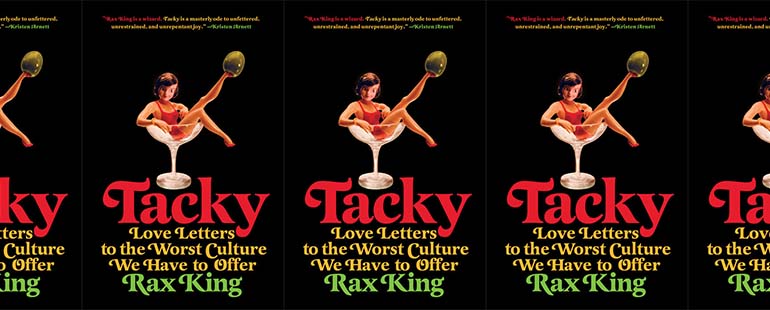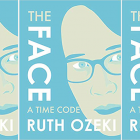Finding Sincerity at The Cheesecake Factory

I have bad taste in music. I seek out playlists containing the phrase “Yacht Rock.” I know way too many Kenny Loggins songs by heart. With December approaching, Christian contemporary star Michael W. Smith’s Christmas album is about to go into my winter rotation . . . even though I converted to Judaism in May.
I know I have bad taste in music because, when I want to, I can also have great taste in music. I love Erykah Badu and Thundercat. Bowie and Fleet Foxes. But sometimes I don’t want to listen to allusive lyrics or virtuoso bass playing. Sometimes I just want to listen to Kenny Loggins earnestly celebrate the joys of playing with the boys, or Christopher Cross long for sailing and wind on his face. I love bad music in the same way I love the breadsticks at Olive Garden, or binge-watching Gigolos during quarantine.
It is with this appreciation for what’s good about “bad” things that I read Rax King’s debut essay collection, Tacky: Love Letters to the Worst Culture We Have to Offer, out last week. Part cultural critique and part bildungsroman, Tacky offers a rigorous defense of low culture while charting her adolescence in the early 2000s, each cultural totem—the band Creed, for instance, or season one of Jersey Shore—serving as a lens through which King explores her budding sexuality, her father’s death, and her abusive first marriage. Intelligent, funny, and unabashedly sincere, Tacky is a much-needed antidote to cool detachment and internet snark, as well as a work of generous commiseration for anyone who was young and naïve enough to fall in love because a cute boy smiled at them at Starbucks, or who thought they could learn everything they needed to know about relationships from Sex and the City.
Generosity of spirit pervades King’s writing and makes Tacky a work of cultural criticism that isn’t critical, instead always attempting to meet its subjects where they are. To this end, King lays out her task and method in the collection’s first essay, “Six Feet from the Edge,” about her love for Creed. While reprimanding music critics who were convinced of Creed’s awfulness but couldn’t point to a specific bad thing about their music, King says, “I think about John Updike’s rules for writing constructive criticism—assess what the creator meant to do and not what you want him to do; if the creator has failed, try to understand where the failure happened rather than just point fingers.” Besides, if people enjoy something and derive personal meaning from it, then can’t it have merit on those grounds alone? “Must we dislike it for its accessibility to people who don’t have the time or, hell, the inclination to study music and develop their taste for it on more ‘legitimate’ grounds?”
Aside from the derisive classicism inherent in even making distinctions between high and low culture—the latter being what is accessible for a majority of Americans—King rightly points out that mockery of tacky things is often a mockery of sincerity. I have had great personal stakes in the defense of sincerity, ever since I learned there are people out in the world who hate La La Land, a movie I believe is nakedly sincere, and love for exactly that reason. And lest you think the irony/sincerity debate has ramifications only for silly Hollywood musicals, I believe that it has vast political implications as well. If all we can do is loathe and sneer and believe nothing has intrinsic value, then dismantling ideas like democracy, valor, and truth becomes much, much easier. And irony is a dead end, a position beyond which there is no further debate, nor substance. David Foster Wallace said it well in a 1993 interview with Larry McCaffery: “Irony’s useful for debunking illusions, but most of the illusion-debunking in the U.S. has now been done and redone . . . Now what do we do?” King similarly argues in favor of forsaking coolness for genuine feeling in her defense of Meat Loaf’s iconic 1977 album, Bat Out of Hell, not only for the benefit of one’s soul as a human being but because irony limits a writer’s ability to perceive and connect. Irony keeps a writer at a distance from her subject, King writes, and distance is antithetical to emotional truth. When we give in to irony, “We resist the hostile invasion of feeling. We hold honesty at arm’s length so that none of us has to face the humiliation of weeping on another’s shoulder, dying in another’s arms. Fuck that, I say.”
Beyond her Sontag-esque examination of early 2000s Americana, King also uses her essays to interrogate her own growth against a backdrop of America’s Next Top Model and Jersey Shore. Here, too, King advocates for the power of tacky things. “Tackiness is joyfulness,” King writes, the embrace of which means, for King, an almost excruciating openness to experience, both shameful and exhilarating, all of it an attempt by her to feel more, love more, hurt more, and be more. That is King’s secondary task in her essay collection: learning how to live while being so open and vulnerable, and maintaining that openness in a world that wants her to turn detached and mean.
One of the most poignant essays in the collection is “Never Fall in Love at the Jersey Shore,” about watching Jersey Shore with her father as he struggled with chronic obstructive pulmonary disease, an illness that would eventually claim his life. King’s talent for making the familiar personal and new is on full display in this piece as she pivots seamlessly from nostalgia to eulogy. She and her father devoured the first season of the show in 2009, sitting on his couch in Maryland smoking cigarettes and eating salami and watching the drunken exploits of Snooki and The Situation. When King went away to college and they could no longer watch the show together in person, she and her father would sit on the phone for hours discussing the week’s episode and making projections for the week to come. A funny and charismatic man who exerted a gravitational pull on those around him, King’s father was someone who wanted only to be fully absorbed in his entertainments. “My father’s collection of curiosities indicated strange taste, but spoke to greater passions than whatever drives people with ‘good taste’—he loved what he loved, to anyone who would listen.” When she expresses regret for not having told him she loved him until the week he died, it is a startling contrast to the visual of the two of them in matching GTL shirts (Gym, Tan, Laundry—a sort of unofficial motto of the show’s characters). Jersey Shore then becomes a bridge between father and daughter, and a shared language that transcends hurt and unexpressed feelings and years of regrets. Not bad for an essay about a trashy reality show.
Later in the collection, King writes about regular visits to The Cheesecake Factory with her mother. A place rightly written off as another corporate chain, King nonetheless defends The Cheesecake Factory and its ilk for providing affordable luxury, its faux marble columns and endless menu and gargantuan proportions performing an essential function for people seeking a brief moment of being waited on, of sitting with a menu and placing an order. “No visitor to The Cheesecake Factory sincerely believes that his Glamburger and cheesecake are the same thing that some Rockefeller eats . . . but the similarities in the two experiences are true, and real, and important.” It is unsurprising in her later essay “Love, Peace, and Taco Grease” when King goes to bat for the much-maligned Food Network star and frosted-tips enthusiast Guy Fieri. In her early twenties, King was married to an abusive and controlling man who made disparaging remarks about her weight, and who once spent three hours berating her for having served him improperly heated toast. The day she decided to finally leave him, she started watching Diners, Drive-Ins, and Dives—the show that made Fieri a star—and as with Jersey Shore, her television again provided solace. Through Fieri’s cheesy enthusiasm and unfettered love for greasy food, King was able to fall in love with food again, and begin to heal. “Guy Fieri allowed me to ask: Who do I fear noise and brightness for? Who do I fear food for? And he gave me the answer: I fear it for myself, and yet someday I’m going to need to take those parts of me back.”
Perhaps what I found so charming and so refreshing about King’s collection is her lack of posturing and her lack of worry for the ways in which she might seem uncool. She opens the collection by telling us how much she loves Creed, for God’s sake. In To Show and To Tell, essayist Phillip Lopate says a great nonfiction writer must “be as honest as [their] courage permits,” seek truth, and allow the audience to come along for the ride as they try to untangle their passions. By being forthright and gracious about her subjects, by bestowing fairness and thoughtful examination on all things tacky, King elevates not only these cultural artifacts, but their devotees as well. You have bad taste? she says. Me too! Let’s be friends.



